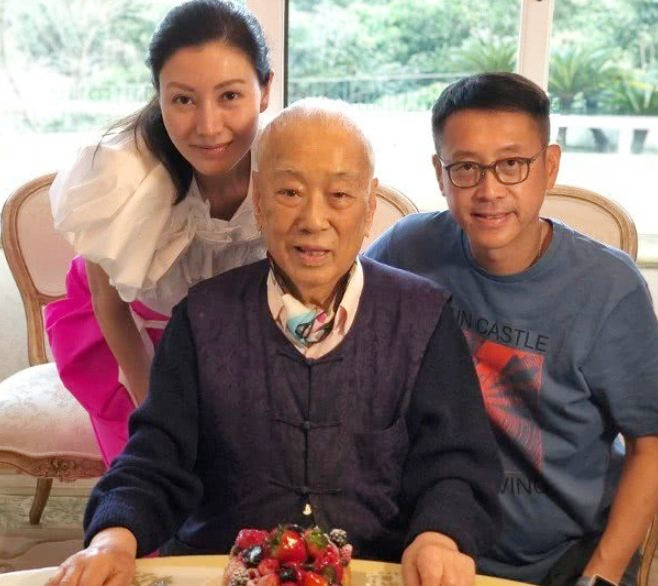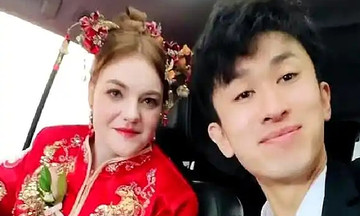Upon his passing in 2018 at the age of 97, billionaire Hui Sai Fun opted for an unconventional approach to inheritance. Instead of directly dividing his assets, he placed his entire fortune into a trust fund. Fifteen members of the Hui family, including his only son, Julian Hui, receive a monthly stipend of 2 million HKD.
While 2 million HKD might be a considerable sum for most, for the Hui family, it requires careful budgeting. Hui Sai Fun's decision sent ripples through Hong Kong, earning him the moniker of "miserly billionaire" in the media, while his son and daughter-in-law became the subject of ridicule.
However, understanding the family history reveals that Hui Sai Fun's decision reflected his character, long-term vision, and understanding of his son's nature.
 |
Hong Kong billionaire Hui Sai Fun and his son Julian Hui, with daughter-in-law Michelle Reis. Photo: 163 |
Hong Kong billionaire Hui Sai Fun and his son Julian Hui, with daughter-in-law Michelle Reis. Photo: 163
The Hui family's prominence began with Hui Sai Fun's father, Hui Oi Chow, born into a farming family in Guangdong. Due to poverty, he had limited access to education. At the age of 10, he joined his father as a dockworker, transporting goods. During his years at the port, Hui Oi Chow recognized the opportunities presented by the burgeoning coastal trade. He saved enough to purchase his first cargo ship, marking his entry into the maritime transport industry. He expanded his fleet to dozens of large vessels, covering Southeast Asia, Europe, and the Americas, earning him the title of "ship king." He later ventured into real estate.
Of his three sons, Hui Sai Fun, the youngest, possessed the greatest business acumen. Following the premature deaths of his older brothers, Hui Sai Fun inherited the family business. Unlike his father's outgoing personality, he maintained a low profile, rarely appearing in public.
Upon taking the reins, he avoided the extravagant lifestyle common among wealthy heirs, diligently preserving his father's legacy. He understood that maintaining wealth is more challenging than creating it. In response to market fluctuations, he prioritized stability, consolidating the family's strengths in shipping and real estate. Subsequently, he sold the family company's entire fleet, generating hundreds of millions of HKD, and invested the proceeds in real estate.
His real estate investment strategy focused on buying low and holding long, gradually accumulating high-quality assets. His astute management skills further expanded the family fortune, placing him among Hong Kong's top 10 billionaires. Beyond shipping and real estate, he also ventured into banking and media, holding positions such as editor-in-chief of the South China Morning Post, director of the Hong Kong Electric Company, and director of HSBC.
He and his wife had two sons and one daughter. His eldest son, initially considered the heir, demonstrated business talent and held great promise, but passed away from illness in 2014.
Left with no other choice, Hui Sai Fun placed his hopes for the family's legacy on his younger son, Julian Hui. Unlike his brother, Julian Hui was pampered from a young age, lacked diligence, and showed little interest in business.
Known as a playboy, Julian Hui frequented parties and was linked to numerous actresses. In 1991, his father arranged a marriage with Pansy Ho, daughter of casino magnate Stanley Ho, to forge a business alliance. The marriage ended after 10 years.
In 2008, despite his father's objections, Julian Hui married Michelle Reis, crowned "Miss Hong Kong" but also known for her controversial past. This union deepened Hui Sai Fun's concerns about the family's reputation and future. He viewed his younger son as lacking the ability and responsibility to manage the family fortune, while his daughter-in-law's image and past could potentially harm the family.
Recognizing his son's limitations, he established a trust fund to provide a monthly allowance. Managing the assets through a trust ensured long-term security and growth, preventing depletion due to mismanagement or extravagant spending. The fixed monthly payments provided a comfortable lifestyle for family members while discouraging excessive spending and maintaining their motivation to work.
 |
Julian Hui and his wife Michelle Reis. Photo: 163 |
Julian Hui and his wife Michelle Reis. Photo: 163
This approach is not uncommon among the ultra-wealthy in Hong Kong and globally. For instance, upon Stanley Ho's death, his family also established a trust fund to provide his children with a fixed monthly income.
Despite the financial restrictions, Julian Hui maintains a luxurious lifestyle with his wife, residing in a family-owned duplex, participating in high society events, and avoiding major financial scandals.
For Hui Sai Fun, his greatest legacy is not just the 42 billion HKD fortune, but a mechanism to preserve the family's wealth and values across generations.
Bao Nhien (From 163)












